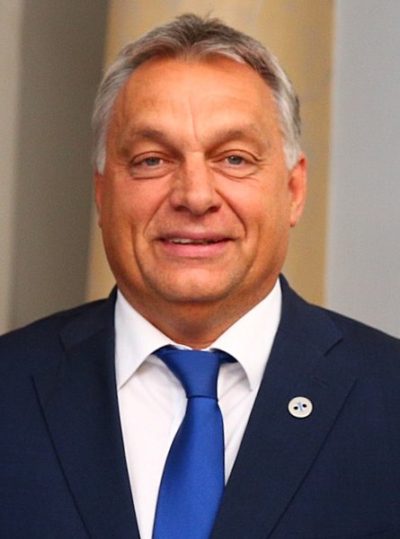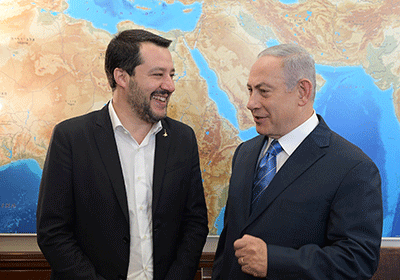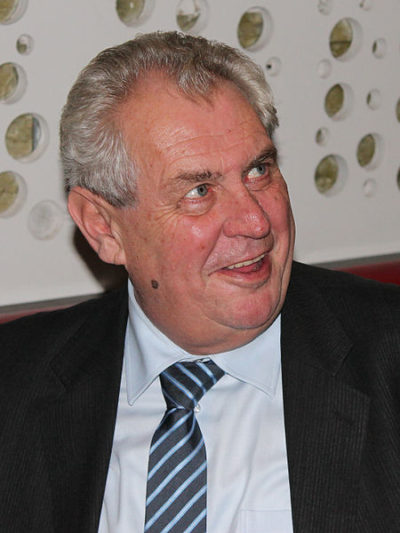When long-time friends begin to desert you, while your enemies grow stronger, you have little choice, especially if the fate of a country is in your hands, but to make new ones.
Israel was once the darling of Europe’s liberal political regimes, but how long ago that now seems. It has been all but abandoned by those naïve Scandinavians, and it is viewed as an uncouth relative by much of Europe’s mainstream liberal governments, though they mouth the occasional platitude about Israel’s need to exist.
Where to turn?
Israeli Prime Minister Benjamin Netanyahu has found the answer: those right-wing nationalists who, whatever their opinions about Jews per se, see in Israel a kindred spirit: a nationalist state, one that has not fallen into the political trap of worshipping the purveyors of globalist utopias.
Such a politics would very quickly see the country demographically engulfed and militarily defeated by militant neighbors who plot daily plot its destruction.
These are far-right politicians who are considered dangerous pariahs and denounced as “populists” by the liberal global elite, and are daily pilloried by the establishment press in Europe and the United States.
Their names are no secret, because some have been visiting the Jewish state and have been welcomed with open arms.

Netanyahu saluted Viktor Orban as a “true friend of Israel” when the Hungarian prime minister arrived for a visit in July. Orban proudly calls his government “illiberal” and has exhibited increasing authoritarianism at home. He has cast himself as the champion of a Christian Europe and is at odds with the European Union over its policies regarding the migrant crisis.
Orban drew criticism last year for praising Miklos Horthy, Hungary’s World War II-era ruler, who introduced antisemitic laws and collaborated with the Nazis in the deportation of Hungarian Jews to Auschwitz.

One of Europe’s most controversial political figures, Italian Deputy Prime Minister and Interior Minister Matteo Salvini arrived in Israel for a visit earlier this week. It prompted criticism over his far-right policies and anti-migration views. Salvini is considered the driving force in Italy’s new populist coalition government and a rising star in the nationalist movements sweeping Europe.
Declaring that he was “proud to be here in Jerusalem, the capital of Israel,” Salvini added that whoever wants peace “must support Israel and protect Israel,” which he called “a fortress of protection for Europe and the Middle East” and a “bulwark of Western rights and values.”
He chastized the EU for its “unbalanced” position on the Israeli-Palestinian conflict, saying the organization “condemns Israel every 15 minutes.”

Austria is a touchy case, though. Austrian Foreign Minister Karin Kneissl would love to visit Israel, but so far has received no invitation. Israel currently boycotts her because of her affiliation with the Freedom Party, now a coalition partner in Austria’s government, which has been accused of antisemitism because of its Nazi roots.
Nonetheless, she has vowed to fight against anti-Zionism and to stand up for the Jewish state in international forums. Israelis are justified in feeling that the EU treats their state unfairly, she said in November, pledging to change that.
Her country, she declared, would take the lead to “inject realism” into the EU’s attitude, arguing that “Israel is often held to a higher standard than other countries.” Israel’s neighbors “are not Switzerland and Liechtenstein, it would do Europe good to remember this sometimes.” The government of Chancellor Sebastian Kurz continues to urge Israel to lift the boycott.
This Israeli strategy, of course, has its own logic. During his July 2017 visit to Budapest, Netanyahu met leaders from the so-called “Visegrad Group,” which includes Hungary, Poland, the Czech Republic and Slovakia.

Czech President Milos Zeman’s speech to the Israeli Knesset in November, in which he stressed that his country is not only Israel’s best friend in Europe but one of its best friends in the world, underscores a major shift in the attitude of many Jews: they now feel safer in eastern Europe than in the west.
Like other east European nationalists, Zeman spoke about what he called “the civilization struggle” – clearly, a concern he shares with others in Hungary, Poland, and elsewhere, about Muslim migration into Europe.
Populist leaders from beyond Europe are also made welcome by Netanyahu. In September, Philippine President Rodrigo Duterte, widely accused of committing human rights abuses, paid a state visit to Israel.
This is a man who has boasted of personally ordering the extra-judicial murders of thousands of suspected criminals, of attacking the country’s media and political institutions, and making outrageous and insulting remarks to all and sundry.
Israelis may grimace at the presence of such people in Israel, but they are all too accustomed to feeling internationally isolated. But they do take comfort in their prime minister building bridges to countries around the globe.

Netanyahu greeted last autumn’s election of Jair Bolsonaro, another controversial hardliner, as the new president of Brazil, hailing his bona fide pro-Israel credentials. Bolsonaro has pledged to move his country’s embassy from Tel Aviv to Jerusalem.
“I am certain that your election will lead to a great friendship between our nations and to a strengthening of Israel-Brazil ties,” Netanyahu told Bolsonaro during a congratulatory phone call.
“Looking forward to your visit in Israel,” he added, referring to the far-right politician’s promise to come to Israel on a foreign trip as president.
This courtship between Netanyahu and far-right leaders displeases Israel’s president, Reuven Rivlin.

Rejecting overtures by Austria’s right-wing party toward Israel, the president has indicated that he strongly opposes contact between European parties with a history of antisemitism and his country’s officials.
While Orban and Netanyahu greeted each other warmly in Jerusalem last summer, Orban faced a somewhat tougher audience later when he met Rivlin, who warned him against “neo-fascism.”
Rivlin received a request for a meeting with Salvini but declined to see him.
Henry Srebrnik is a professor of political science at the University of Prince Edward Island.

